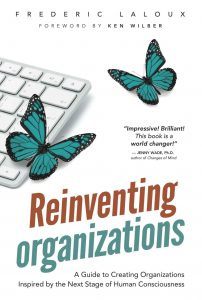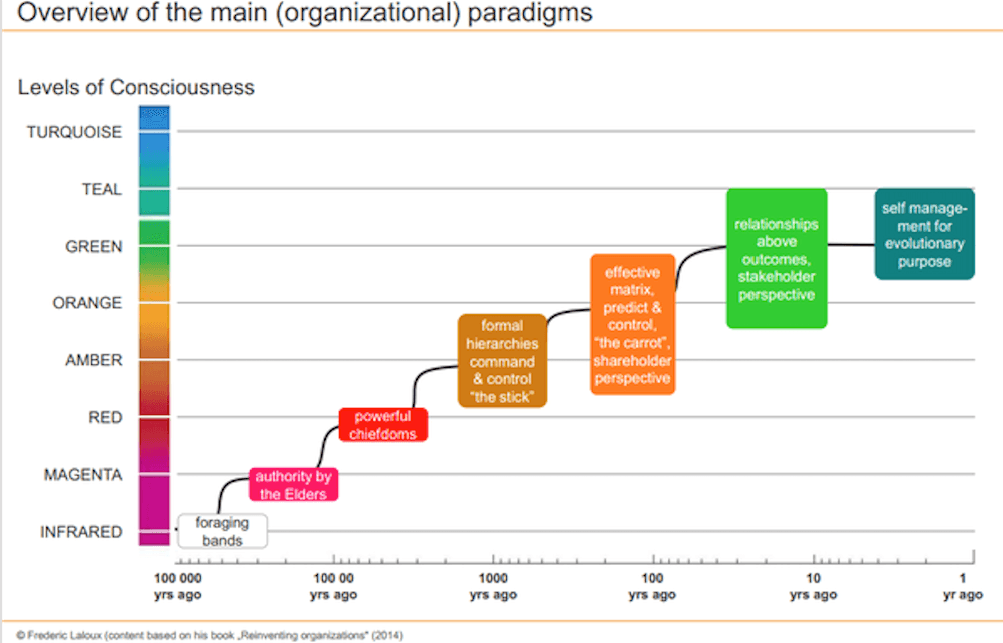Reinventing Organisations – where talent blooms and our callings are honoured
Frederic Laloux’s highly acclaimed management book Reinventing Organizations explains how every time humanity has shifted to a new stage of consciousness, it has also invented a radically more productive organisational model. I witnessed this new stage of consciousness come alive in the audience at the RSA London last week, as Laloux talked about his Evolutionary-Teal perspective and his view on How to become a Soulful Organisation. You can watch a 7-minute excerpt of his talk here. Or if you want more, you can find a 20 minute version of it (the talk is 20 minutes, the rest is Q&A) here.
I’m working in a company without bosses. We all feel that our evolving, collective purpose is aligned with our own life’s purpose, albeit to different degrees. Top down performance appraisal is replaced by peer reviews. We start our meetings with a few minutes of attention training that some call meditation. This helps us become centred and reduces the distracting inner chatter. In our company, sharing what would be a dream project for each of us to work on inspires all. It’s not a utopian nowhere land. We do have frictions, but they are actually invited when principle-based objections to a proposed decision can make it better. I’m proud of our company, enjoy working there and wish that people everywhere could work in such conditions if they choose to.
 Are we at Future Considerations the only lucky ones, who managed to change the rules of the game?
Are we at Future Considerations the only lucky ones, who managed to change the rules of the game?
Certainly not, but the still relatively few “new paradigm” companies are in sharp contrast with what Laloux described as follows: “The widespread lack of motivation we witness in many organizations is a devastating side effect of the unequal distribution of power. For a few lucky people, work is a place of joyful self-expression, a place of camaraderie with colleagues in pursuit of a meaningful purpose. For far too many, it is simply drudgery, a few hours of life “rented out” every day in exchange for a paycheck. The story of the global workforce is a sad tale of wasted talent and energy.”
Laloux is, of course, not the only one to note that. A reviewer of his book in IBM Connections wrote: “Survey after survey shows that a majority of employees feel disengaged from their companies… All these organizations suffer from power games played at the top and powerlessness at lower levels, from infighting and bureaucracy, from endless meetings and a seemingly never-ending succession of change and cost-cutting programs. Deep inside, we long for soulful workplaces, for authenticity, community, passion, and purpose.”
Well, that’s certainly true, but longing is not enough. Fortunately, Laloux goes further, and he is asking, “Can we create organisations free of the pathologies that show up all too often in the workplace? Free of politics, bureaucracy, and infighting; free of stress and burnout; free of resignation, resentment and apathy; free of posturing at the top and the drudgery at the bottom? Is it possible to reinvent organizations, to devise a new model that makes work productive, fulfilling and meaningful? Can we create soulful workplaces – schools, hospitals, businesses and non-profits – where our talent can bloom and our callings can be honored?”
Laloux’s book has a rich set of case studies of organisations whose experience provide a big YES to those questions. There are three common elements in their practices. In this video Laloux explains them.
At minute 36, the talk goes into self-management; at minute 52 into wholeness at work; and at 1:06 into the evolutionary purpose in organisations.
Another reviewer of Laloux’s book, senior change architect Bill Veltrop wrote, “Our top-down, control-over-people, compartmentalized organizational designs are not a good fit for our times. Their rigidity leaves such organizations highly vulnerable in our volatile world.”
The subtitle of the book – “A Guide to Creating Organizations Inspired by the Next Stage of Human Consciousness” refers to something larger than a new management style or fad. It refers to the subsequent stages in the development of our consciousness, which finds a reflection in how we manage our organisations. The diagram below connects those stages with the corresponding management paradigms, inspired by the framework of integral philosopher Ken Wilber.
Laloux’s book is the result of 3 years of groundbreaking research into the emergence of an alternative to the organisational cultures and structures we inherited from the past two centuries that don’t serve us anymore. Most of the companies featured in his book are small to medium size, and one of the pushbacks the book frequently receives, including from my students in the MBA class (where it’s required reading) is this: Can it really work with large, very complex companies?
A good example of “yes, it does” is Zappos, one of the world’s largest online shoe stores, worth well over $ 1 billion, which has 1,500 employees and a family culture. It also has a structure with no job titles, no managers, run by self-managing teams capable to handle complexity, as described in Huffington Post.
However meeting the challenges of large-scale complexity with self-management is not a trivial task. To make that happen, by replacing command-and-control with sense-and-respond, employees have to be very clear on what they need to do and why.
As Lee Bryant said in his blog on ‘Frederic Laloux: there is something in the air’ – “Although the heart of this approach lies in humanising organisations, I think technology also has a key role to play especially in larger firms. Better tools are needed to help local leaders see the shape and capabilities of their organisation as it changes, and could also help scale the advice process, resulting in greater transparency of thinking and decisions as well, which can remove one of the basic arguments for management oversight and formal reporting lines because everything is visible. A good example of this is the way Automattic, the company behind the WordPress platform, operates as a virtual organization.”
Here at Future Considerations, we have been following Frederic Laloux’s journey closely since he published his book last year. Future Considerations to us is a living system powered by the three common elements of all soulful companies, as mentioned above: Self-Management, Wholeness at Work and Evolutionary Purpose. We are passionate about midwifing the emerging world of this organisational paradigm, by prototyping, in partnership with Laloux, workshops and simulations that will help organisations realise the benefits of reinventing themselves for the 21st century. If you or your organisation would like to get involved, or just to be on our mailing list to receive more information (when it will become available), then please comment below or get in touch, by contacting Kylie Taylor kylie@futureconsiderations-copy.dev.




At a recent talk hosted by the UK Chapter of Conscious Capitalism, Sudhakar Ram, CEO of major software company Mastek and author of “The Connected Age” gave a presentation on the journey his company (3000 people) has been making. All of the themes from Frederic Laloux’ talk and this blog were echoed. There is indeed “something in the air”.
Spiral Dynamics, the theory that sits inside Wilber’s perspective describes the way in which our new human thinking emerges in order to solve the problems created by our previous evolutionary step. What we face now is encapsulated in the words “volatile world” that Bill Veltrop used in his review. We are dealing with speed of change in multiple dimensions compounded by speed and interactivity and accentuated by urgency. We cannot isolate the variables in order to practice command and control and no CEO can manage the interactions from above. The only sustainable solution is one which is responsive, agile, based on distribution of sensing systems and action choices through the whole of the organisation. Just as our bodies have intelligence in every cell and organ, not just in our brains, the organisation must function as an organism.
The examples from Frederic’s book and elsewhere provide plenty of evidence that this works – both in putting soul and spirit back into working life in place of a mechanistic treatment of human beings and in following principles of natural design which offer functional efficiency based in flexibility and flow. We face a challenging future in which organisations will need to be internally sustainable in financial, human relationship and resource terms and at the same time be part of a sustainable living planet. Shifting our mindsets, our cultures and our systems into this new, non-linear way of operation is a major key to our ability to thrive.
Jon, thank you for your very substantive comment.
Based on your vast experience in working with organisations, how do you so the relationship between the inner development (formal or informal) leaders and the evolution of the organisation?
Inspired and inspiring, George – and I would expect nothing less. This is evidence-based confirmation of all that we have talked about. Much love to you. R
You may also enjoy a book I wrote — FLAT ARMY: Creating a Connected and Engaged Organization — published in 2013 which contains similar themes to Frederic’s book.
Thank you Dan for stopping by. It’s nice to know that the Chief Envisioner of TELUS Transformation Office is reading our blog. May I ask, how did you discover us?
This is great George!! Thanks for sharing. I was so inspired by reinventing organisations. I am working on ideas about how to bring this into a community process where there is the right balance of self expression, emergence and accountability from the heart. Love to be on the mailing list and continue the exploration and cocreation
A frequent “yes, but…” that I hear from my MBA students and some clients is this: Can a large company be really soulful? Let me answer to that question with the words of somebody, who has recently visited one:
“Among larger, multinational companies, the one that has made the biggest strides in restructuring the work environment is Google. They are famous for doing things that nobody else has done. They have meditation rooms scattered around the Google complex in Mountain View, California. They serve high-quality organic food in the dining room, which is all provided free for employees. Wherever you go, you can see examples of thinking outside the box to make things more fun and interesting. As a random example, I remember when I spoke there that there was a slide to get from the first floor back to the lobby. They’ve invested unprecedented amounts of energy in exploring technologies to elevate consciousness, and to support people in bringing forth their innate brilliance.” http://arjunaardagh.com/reinventing-organizations/
See the slide that he is talking about, here: http://arjunaardagh.com/wp-content/uploads/2014/11/IMG_1374-225×300.jpg
Thank you, George, for summarising our endeavours to organise in a wholesome, enterprising, and fulfilling way at Future Considerations. You have got me thinking. As “there is something In the air” implies, we are part of a fundamental shift in the world that many people are sensing and supporting. The world of work is about every aspect of our lives, including education.
Your work with the MBA students to bring this level of development to the next generation in an experiential and real way is very important and a great example to follow. Just as Otto Scharmer has challenged the Higher Education Sector to transform the way it does education with his current U-Lab MOOC – http://bit.ly/18PQFn7 – there is a collective responsibility on us all to also ensure that the world of education is set to prepare our successors for a different world of work.
As we continue on our own journey of exploration and learning about new organisational models, can we all be mindful of ways in which we can contribute to building education systems that are made up of soulful learning establishments developing soulful learners?
Dear George, I enjoyed our conversation about this topic earlier this week. Like Future Considerations, I have been following Frederic’s work since he published his book. I feel that our work at Visual Facilitators is like one of many bridges between disciplines, levels, cultures… Using visual facilitation, graphic recording and strategic illustrations can actually support such transformation like so beautifully described in your article and the book. It is a co-creation and so beautiful what unfolds through Reinventing Organizations!
Thank you George, this really resonates with me. It makes sense that complex systems require structure and processes but are far too complex to be managed by traditional forms. I currently work in the NHS and this and the wider health and social care system must qualify as a very complex system. I have been actively employed in the orange zone working in transformation, change, improvement and innovation, trying hard to make a difference and make it better. I absolutely recognise the orange zone story of pre-Buurtzorg nursing in the Netherlands and the impact this had on quality of experience. The advice process as a system of collective intelligence which can provide the best for patients and also empowers the individual health practitioner to make timely decisions that can make a real difference and deliver quality care seems common sense, practical and ethically desirable. It is often the lack of ability to respond to people’s needs and perceived misalignment of personal and organisational values that results in staff disillusionment with the health and social care system to the point where they need to leave.
The role of leadership is to listen to where the organisation naturally wants to go and then support this. They have a clear intent but do not write strategies, have targets or budgets. They do not spend time trying to predict the future and make plans and instead concentrate on the current reality and adjust accordingly. In the NHS would be require an ability to listen and really hear the collective and individual patient/service user voice and respond accordingly making the best use of new health technologies and applying new practices.
The Network of Communities of Practice we have been working with Future Considerations to develop speaks to this work. The approach itself attracts and retains people, empowering them to work collaboratively to generate a collective intelligence. It harnesses the passions of people within the communities to develop new knowledge and practices which can move elements of the system closer to this new evolution; whilst the looser connections between communities and constellations of communities have the potential to evolve the radically new ways of working, caring and being that we need. It would be interesting to explore further how the Co-creation Network can be part of this evolution.
Thanks, George. Everywhere I look folk are reading this book … something in the air for sure. What I am also interested in is the role of the CEO. Laloux says the CEO has to lead this transformation to teal. For sure. How, then, can we support large numbers of CEOs to have the necessary epiphanies to transform then into evolutionary leaders? Perhaps I’m just attached to humanity’s survival on planet earth, to biodiversity and to the avoidance of unnecessary suffering, but from where I sit the need is big and urgent.
Robin, you have the best kind of attachment which I’ve been sharing until I heard Thomas Hübl quoting these lines from Lao Tzu: “The world is sacred. It can’t be improved.” First it made the evolutionary agent in me perplexed, then I interpreted it (in the context of organisational transformation) as follows.
Organisations are living systems that cannot be improved from the outside. They change according to their internal conditions, one of which is the developmental stage of their leadership. Laloux’s book hits a nerve in the leadership of business and other organisations because the best of them have recognised that the current “command and control” structures and processes are not sustainable in the long run.
Forward-thinking, future-responsive CEO’s and senior leaders are looking for alternatives that are more empowering their people and, eventually, make “employee engagement” programmes obsolete. So your instinct to “support large numbers of CEOs” in becoming evolutionary leaders is spot on!
Your insight evoked my epiphany of a TLC (Teal Leadership Club), where senior leaders from different sectors can meet and share their questions, discoveries, concerns, and experiences on the journey of embodying Teal values with increasing coherence. I can hardly wait to share this with my colleagues in Future Considerations at our next Company Circle.
What do you think of this idea?
Hi George,
I think the TLC is a great idea, and would also chip in that my wife, Kosha Joubert, who is President of the Global Ecovillage Network, and I have been dreaming into cross-sector dialogues where, for example, CEOs come face to face with grassroots activists from the global south, alongside NGOs, government and inter-governmental agencies inter alia. The purpose of this would be to create the conditions where deeper understanding / insight / epiphanies might arise, as well as to alleviate the demonisation of ‘the other’ which is prevalent in each sector. Sectors tend to talk to themselves, (even in the TLC!). What insights might arise when they talk to others?
Robin, your reference to the cross-sector dialogues comes with auspicious timing. We just started looking into further developing our work with multi-stakeholder initiatives/networks. More about that, soon… You can look up an example of our work in that space here: http://futureconsiderations.com/what/stories/the-climate-development-knowledge-network/ .
Hi George. Glad to learn of this exciting work! (The link to the 7 minute excerpt didn’t work for me btw.) Very excited about multi sector initiatives as well; was recently involved in a collaboration of innovative funders and climate justice activists.
I started collecting the names of companies inspired by the ideas and practices reflected in “Reinventing Organizations”. The situation reminds to a moment, 20 years ago, when I used Mosaic, the first web browser to access a site called What’s New, which listed every new sites appearing on the web, everyday.
When the paced reached 1000s of new site/day, both What’s New and I gave up on keeping track of them. We are not there yet with evolutionary purpose, self-managenent, and wholeness, but may well be in a few years.
Great to hear you are doing this, George. Is the list available for us to see / add to?
There’s a Reinventing Organizations wiki in the making. We’ll post the list there.
Seems a little quiet here. The discussion area for Reinventing Organisations is at http://discourse.reinventingorganizations.com/
Another place with great discussion on reinvention topics is https://www.facebook.com/groups/enliveningedge/ .